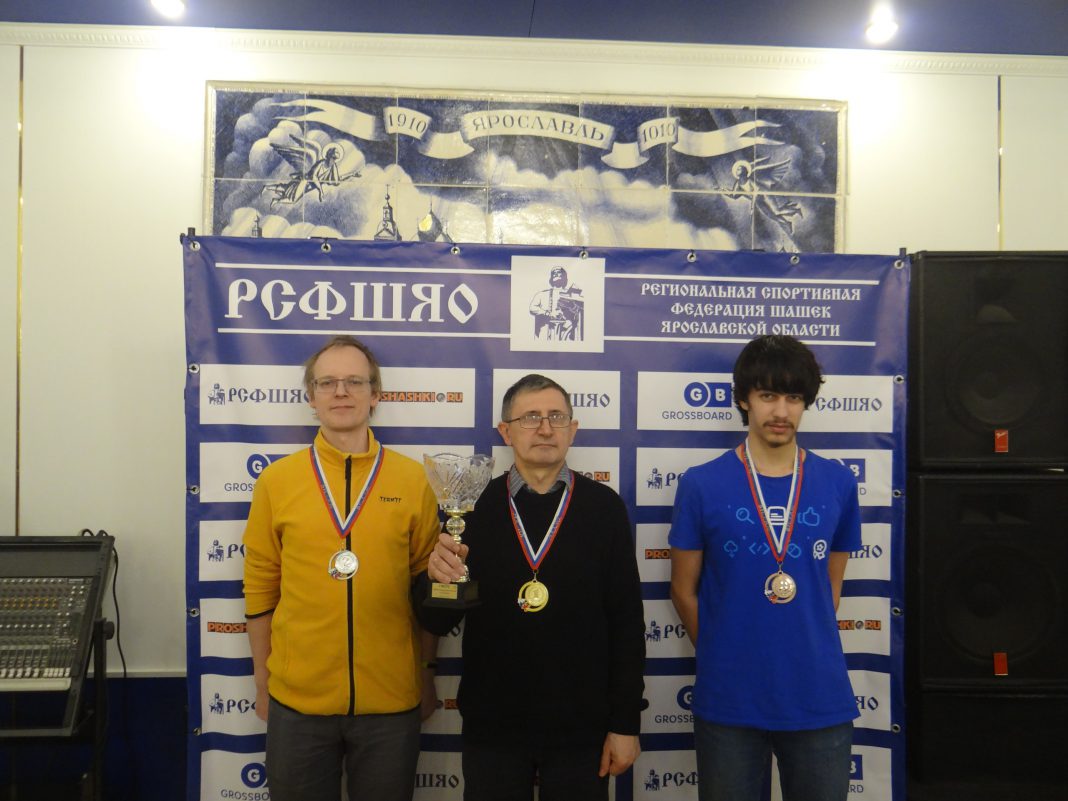Russian Renju Championship, 2020
The twenty-eighth consecutive Russian Renju Championship has ended. Sixteen strongest players who passed the preliminaries gathered in the city of Yaroslavl and played a big Round Robin. Most of the participants are from Moscow, St. Petersburg and the corresponding areas. In addition, Nizhny Novgorod, Krasnodar region and Volgograd region was represented by one player each. For the first time since 1999, the Arkhangelsk region was not represented in the final.
The tournament was very intense, tight. The intrigue remained up to the last round everywhere: in the struggle for gold, and for medals, and for places in the top 6, and for the top ten, and for not being the last. Usually I’m writing about tournaments through the prism of my own games, this time I will try a report to share the feeling of this long and tough battle.
So.
The start list, ranked by Russian rating: Oleg Fedorkin, Pavel Makarov, Epifanov Dmitry, Konstantin Nikonov (all Moscow), Maxim Karasyov (Nizhny Novgorod), Denis Kachaev, Sergey Artemyev, Pavel Salnikov, Vladimir Filinov, Victor Balabhai (all St. Petersburg), Maxim Lavrik-Karmazin, Ivan Danilin (my students, Moscow), Alexei Mikhailov (Kotelnikovo, Volgograd Region), Edward Rizvanov (Novorossiysk, Krasnodar Region), Ilya Katsev (St. Petersburg), Egor Morozov (also my student, Moscow).
I don’t remember any special forecasts, but it seems that there should be Makarov, Fedorkin, Nikonov among the favorites since they usually share the podium. In addition, one might expect a good performance from Edward, an experienced gomoku player who won the qualifying tournament. And one should never discard Maxim Karasyov who sometimes shows outstanding play level.
And in the very first round, Edward overplayed me in i7. Alas, instead of making the exact 15th move, I decide to prepare it a bit more thus missing the win. Ed launches a counterattack, but plays hastily after my defensive rally 51-53-55 and misses the victory leaving me the opportunity to escape. However, in time pressure I’m making one more mistake on the 77th move, and the job is done: the young ambitious gomoku player is gaining his first point!
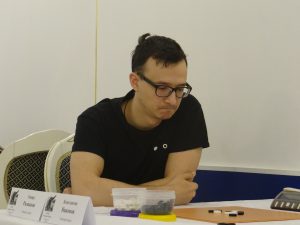
Edward Rizvanov, Novorossiysk
And that’s not the only failure of the rating favorites in the first round. Oleg Fedorkin puts D1 against Sergey Artemyev, he answers with 4th move, Oleg takes a black color and offers the necessary number of alternatives. Sergey immediately discards one of them as being too strong for Black, leaves the other, but with his 6th move he immediately gets a position exactly identical to the strongest continuation for White in the move rejected by him. Why so? I have no clue, but, apparently, it worked on Oleg, he loses the initiative and loses to Sergey.
In the second round, Oleg and I, both suffered a heavy defeat in the morning, can’t find the inner inspiration for a positional struggle in the old continuation of i10, a quick draw. Both Maxims, Vanya and Egor score a point, so Danilin, Nikonov, Salnikov and Karasyov are the leaders after the first day, 2 of 2. And I am situated behind all my students: Vanya is a leader, Maxim and Yegor have one point, and I’ve got only half.
The third round was marked by a theoretically interesting clash between Oleg Fedorkin and Pavel Salnikov. They play D9 with a shift by one point, which is obtained from i4 and D10 openings. It is commonly believed that White has another 12 move there which is better than the canonical one and which is impossible without a shift due to the decisive development of Black. Oleg plays this 12th, but as the game goes on, Black gets the upper hand, Pasha creates a nice base for the attack. There were no realization, as a result, it’s a draw, and it seems that White didn’t really play for victory. Another spectacualr game was played by Alexei Mikhailov and Ilya Katsev. They started with D12, little-known and not very correct 4th move, erroneous 5th performed by Lesha, exact 6 performed by Ilya, Ilya’s mistake on the 12th move, which did not become fatal due to Lesha’s mistake on the 13th move. It is very easy to write it sitting behind the computer with Renju software launched, but it is a titanic calculation for both sides being behind the board. In this calculation Ilya performed slightly better – just enough to win. And on the other board, Yegor Morozov convincingly proves that it was not a pure luck that he came to the tournament. In D3 which he puts against Pavel Makarov, the reigning champion, he offered the canonical RIF 4th move with two alternatives, just as in good old times. Makarov chose white, and then Egor not only handled the champion’s attack, but achieved advantage in the middlegame and launched a victorious forced attack with Black. This is a full sensation!
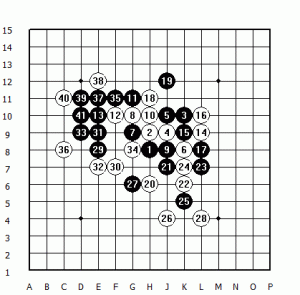
Round 3. Morozov E. – Makarov P., ● 41
In the fourth round, however, Yegor stumbles. Victor Balabhai opens i7, Egor gets Black, strives to seize the initiative, but Vitya’s prolonged positional attack ultimately leads White to success. Alas. Makarov beats Vanya, and it seems to stop his impulse. Nikonov takes the fourth point in a row. Oleg Fedorkin is also successful against Denis Kachaev in the canonical development of D3. I followed this game with interest: what are the new trends here? Maxim Karasyov, having put i7 against me, receives a “halyava” in return, a transfer to the variant common with the D4, where Black has the necessary eight winning alternatives. But behind the board Maxim doesn’t offer all the winning 5th moves, one of alternatives is playable. White leaves the opening with a touch of initiative (and a Damocles sword of Maxim’s counterattack on the other flank), but then Maxim makes a mistake on the 11th move, and a nice VC2 threat 14 (!) instantly decides the game.
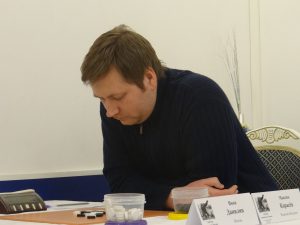
Maxim Karasyov, Nizhniy Novgorod
After the second day Kostya Nikonov is the only leader, scoring 4 out of 4. Pavel Salnikov follows with 3 points, and the next group, 2.5 out of 4, already consists of three players: Vanya, Edward and Ilya Katsev keep their balance of wins and losses positive. Our section stands still: Maxim, Yegor and me have 2 points, 50%, Vanya pulled forward a bit, having 2.5. There are no participants with zero points left in the tournament, Volodya Filinov closes the standings with 0.5 out of 4.
In the fifth round Nikonov meets with Maxim Karasyov who achieved a lot of silver and bronze medals of Russian championships but has never become a champion. Maxim yet can’t gain momentum, and Kostya is not inclined to help with it. They play standard D4 development with the usual fifth move, White misses the best plan on the 22th move and eventually loses initiative, thus giving Black an easy win. Pasha Makarov does not manage to beat Lesha Mikhailov in the main common development of D5 and D12. I play variation of D1, which I have played with Vova Sushkov in AT-2019, against Salnikov. He offers a good 9th move, which, however, is usually played with 7th being played to the short side, not to the long one. Black tries to tie the flanks by 13th and 15th moves, but after 16th White feels calm. After 19th it’s time to play actively, but I mistakenly decide to trample a little more – as a result, Black gets excellent development and a long attack, which, fortunately, does not lead Pasha to victory. But in the end there is nowhere for White to win, so it’s only a draw. Meanwhile, Edward easily beat Filinov, and Vanya Danilin in a long, exhausting game catches a foul against Balabhai.
In the sixth round, Maxim Karasyov quickly defeats Pasha Salnikov in the not-so-well-known fifth move of i8, which requires White to be accurate and precise in play. As it often happens with Maxim, he starts weakly, losing a lot of points on mistakes of various origins, but in the second half of the tournament he is able to beat anyone and usually does it. Makarov opens with D2 against Edward Rizvanov, Ed turns the position into a well-known variant of D4/D6/D8, Pasha does not make the most common 12th move, but Ed fails to offer an adequate plan in response, so White, having made several accurate moves in a difficult double-edged position, gets the upper hand. Nikonov meets with Morozov. Egor with White stubbornly resists attempts to launch an attack, but finally Kostya manages to achieve the concentration of stones necessary for victory and win. I play with Denis Kachaev, and make a mistake on 12th move, giving Black a powerful, but not decisive attack. Being persuaded by the attacking opportunity, Black gets a rather difficult position by the twentieth moves, but a nice 25th and 27th moves makes it possible to equalize the situation while maintaining mutual chances. Denis played a non-necessary four on the 29th move, but according to the analysis after the game 29th being played to the point of 31st provided Black with a very difficult win. But after 29-29, 31-31 Black encounters the absence of lines to develop an attack on the upper flank so Denis is forced to switch to passive defense. I’m starting with an unpromising corner to gather some extra resources when entering more promising flanks. But inaccurate 67 allows me to add many different attacking capabilities of White, related to playing different fours in the depths of the position. As a result, after 72 moves there are no defenses, but remember, we both are in a time-trouble for a while. After 73, I see a 3×3 foul (nonexistent), then I notice that one of the threes is not a three actually because it has a 4×4 foul in the focus. So I decide to extend the line with an auxiliary three from the periphery. I spend a few minutes on calculation, and only during the last check, at the last moment before making the move I realize that after trying to create an overline I will catch the opponent a 4×3 fork. I’ve got thirty-five seconds on the clock, I have no idea what to do, and at this moment I see a win starting from the other three and leading to a 4×4 foul. I calmly check (seven seconds remain on the clock), make a move, win.
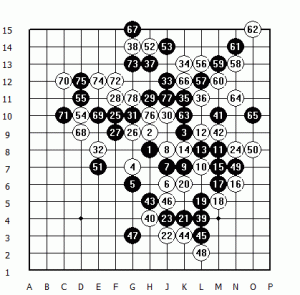
Round 6. Kachaev D. – Epifanov D., ○ 78
At the end of the day, Nikonov leads with an impressive 6 out of 6. The runner-up is Vanya Danilin, who won both games of the day and follows with 4.5, third is Fedorkin (4/6). 4-6 places are being shared by Salnikov, me and Edward Rizvanov. Well, after the second day we say that the tournament has just begun, 4 rounds out of 15, now it’s time to take up the mind, tomorrow the equator! Odds, however, have not been lost to anyone.
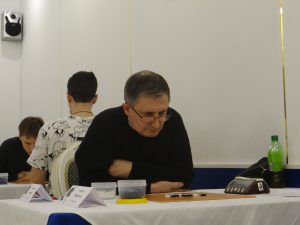
Konstantin Nikonov, Elektrostal, Moscow Region
The seventh round begins with Ed’s quick victory over Balabhai. Ed generally plays very fast, and this does not always lead to the consequences that he would like. But this time after 12 moves Black cannot resist, the win is clear. Pasha Makarov overplayed Oleg Fedorkin, who repeatedly had the opportunity to escape. Ilya Katsev in a common variant of D1 closes my three on the wrong side, so I have a simple win on the 12th move, but I find another one, much more complex. Finally, Egor Morozov opens with D3 against Maxim Karasyov, Maxim turns it into i5, falls under a strong attack of Egor and loses. The leaders, Kostya and Vanya, play among themselves. Vanya puts D12, Kostya makes 4th move, common with the i4 opening (with 8 alternatives), and Vanya takes black. Black’s attack develops up to move 11, Kostya defends himself against the black congestion by move 12. In response Black finds a powerful idea of ???отрыв, after the 15th White is doomed. Spectacular win, well done, Vanya!
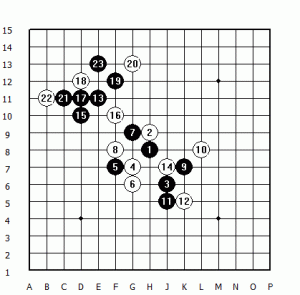
Round 7. Danilin I. – Nikonov K., ● 23
And here comes the equator, the middle of the tournament. Volodya Filinov is mistaken with the 7th move in D10, I manage to find the decisive continuation. Vanya pretty easily defeats Egor by making a provocative 6 move in Egor’s D9 opening. Pretty risky but rewarding way to play. Edward in D1 makes a well-known losing 5th move, but Maxim Lavrik-Karmazin fails to put White’s advantage in a good use, and as a result Black wins. Maxim Karasyov continues restoration of his reputation, this time Denis Kachaev, who made a bet on the marginal fourth move, becomes a victim. Nikonov makes an unforced error in a game with Alexey Mikhailov, easily losing a game. Balabhai in D6 against Fedorkin plays the fifth move, about which even children know that it’s a loss. Is it halyava or a mistake? Perhaps the latter. Oleg beats Vitya in 16 moves.
According to the results of the fourth day, the leader with 6.5 points out of 8 is Vanya Danilin. For the last four rounds he knows nothing but victories. Two defeats push Nikonov to the second position, he has 6 out of 8. Edward and I are closing the gap to the leader, we have 5.5 points. Pasha Makarov and Oleg Fedorkin are in top-6, they have 5 out of 8. Then there is one point gap, Karasyov and Salnikov have 4 out of 8. Yegor and Maxim L.-K., alas, have only three points, and the 16th in standings is Filinov who scored one and a half.
In the ninth round, Sergey Artemyev makes a quick (11 moves) draw with Viktor Balabhai, clearly declaring his lack of intention to fight for the top 6, although the chances, IMHO, were still not bad. Maxim L.-K. managed to develop an attack against Oleg Fedorkin in the not-so-strong black variant of D1, and was rewarded with a point. Pasha Makarov in another variation of D1, which is pretty good for Black, but without well-known overly strong developments, tried an interesting plan against me, then it seemed to him that he has a strong forced development, but there was nothing except White’s merciless counterattack. The game with Pasha always has important psychological significance for me, and the easy win, of course, was very inspiring. Maxim Karasyov beats Vanya Danilin due to an unforced error in the time trouble of the latter. Nikonov decides to play something from the past centuries of D11 theory with Edward, Edward finds the basic ideas for White’s strongest development, but, alas, after playing the extra four he gets a position with Black’s complicated VCT, which Kostantin clearly performs.
In the tenth round, Nikonov plays an instant draw with Oleg Fedorkin (4 moves), Vanya and Maxim easily beat their counterparts, Pasha and Pasha draws among themselves, Edward by the 30th move takes complete dominance in the position with Egor and then wins. I encounter Vitya Balabhai who plays another 5th move, about which all children know that it’s a loss, but not the same as in the game with Oleg. I make a strong-willed decision not to try to solve it with an attack in the corner, to which Vitya is probably prepared well, and where I can miss some precise move, but just play a position with White advantage, and Vitya is already mistaken by 11th move, letting me go for a VCT. 19th move could be played much more stubbornly (although it was also lost there), but Vitya played the way he played, and the file is closed in 22 moves.
At the end of the fifth day, three of the main contenders for medals are drawn up: Vanya, Kostya and me are leading with 7.5 points. Edward (6.5), who has not yet lost the chance of a medal, is one point behind, Maxim Karasyov (6) goes fifth, Pasha Makarov, Pasha Salnikov and Oleg Fedorkin (5.5 each) participate in the struggle for places in the top-6. Remember, six best players will dodge preliminaries next year and have personal places in Russian Championship-2021 finals. Maxim Lavrik-Karmazin is pushing the leaders with 5 points. Egor still has 3 points.
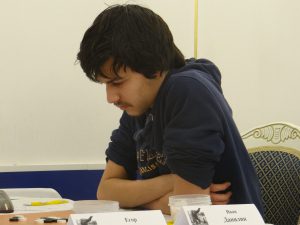
Ivan Danilin, Moscow.
In the eleventh round, Vanya meets with Edward. Ed puts i6, Vanya comes up with a plan where Edward’s lack of knowledge may pay dividends. In the game, however, the white could equalize the position by move 15th, but their passive playstyle and a couple of insufficiently accurate defensive moves performed by Edward afterwards lead Black to a logical victory. The principal duel of the young leaders has taken place, and the duel of the elders will soon take place. Oleg Fedorkin inaccurately plays 13th move against Morozov, but Egor does not find the strongest development, loses initiative and loses. Mikhailov gives Maxim Karasyov the opportunity to attack with White in a promising position, in response Maxim successfully attacks. Artemyev gives battle to Nikonov, successfully survives the middlegame and drags Konstantin into the “white” endgame, and although Sergey cannot win, Nikonov loses precious half of the point.
The main game of the twelfth round is Nikonov vs Epifanov. Konstantin opens with i3, I decide to play a common variant of D1 with four alternatives. As expected, my opponent takes black, sets the required number of alternatives, I answer … In a short while, it’s time for White to propose a variation that will be played. I decide to play a plan that I once discussed with Vova Sushkov. Alas, in those ancient times I’ve found a strong development for Black, but it is technically very difficult, so why not. Kostya plays pretty confidently until the 19th move. Here White’s position is rather sad: both the attack on the left and the attack from below are threatening me. For example, covering the triple formed by the 19th move loses. After some frustration I came up with a move that allows to withstand two scattered ice floes, at least for a while. Alas, there is also a strong plan for Black, rien n’est parfait, but Kostya weakens his steel grip a bit, so White can even create a VCF threat and launch a counterattack on 24th move. I’ve calculated it a bit but rejected because at some point Black has two defenses that I can’t refute, while Black at the beginning of the variation gets so much power at the bottom flank that you don’t even have to dream about withstanding the attack. In general, believing that the mathematical expectation of the points scored is likely to fall, I refuse the attack opportunity. Subsequent home analysis showed that White could develop a really strong and nice attack, probably winning. Anyway, Black chooses tough, forceful development with a goal of 41st move. Fortunately, after 42, White is already safe, the opponent’s strong attack disappeared, and I have some counterplay options on two different flanks. Good news! But Black, after several moves of active defense, also finds the opportunity to stand on two ice floes: the inner 53rd move repels the threat below, and does not make it easy to win in the top left corner. Nevertheless, I check Nikonov’s defense there, and when it becomes clear that White does not have enough resources, I offer a draw, not wanting to spoil the canvas with the persistent expectation of a mistake caused by time trouble.
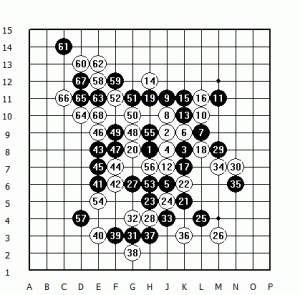
Round 12. Nikonov K. – Epifanov D., = 68
Mikhailov and Rizvanov play the well-known i12 / D12 / D11 variation, Ed cannot win with white, as a result, a draw. Vanya Danilin in a game with Oleg Fedorkin tried to activate Black stones in D10/i4, did not win, then managed not to lose, as a result, also a draw. Maxim Karasyov put Volodya Filinov i7, long story short, also a draw. Denis Kachaev wanted to trick Balabhai in D8 with the canonical 4th move, Vitya tricked himself by misplacing one of 5th moves, but was stubborn enough to survive nevertheless, again a draw. What a drawish day!
According to the results of the sixth day, Vanya becomes the sole leader (9 out of 12). Then Nikonov and me come (8.5 pts each), Makarov and Karasyov (7.5) are behind by a margin, Fedorkin and Rizvanov are also participating in the fight for the place in the top-6 (7 points) , to a lesser extent Salnikov (6.5) and barely Maxim L.-K. (5.5) are also involved. It is clear that gold will be achieved by one of the leading three who will more reliably play the last three rounds; experience suggests that at least one of us will score 3 out of 3 in the ending. At the same time, the position of Vanya is slightly better, but he also has less experience with such tough finishes. Finally, the game between me and Danilin has not yet been played; its result can turn in favor of any of the leaders.
The thirteenth round brings a disaster: Vanya decides to deviate from the Tiger diagram, makes a rather weak sixth move, and his opponent, Sergey Artemyev, manages to develop a powerful, concentrated attack. Productive attack. Both me and Nikonov beat our counterparts (Egor and Pavel Salnikov, respectively), and the situation in the top three changes a bit. Now Vanya needs us both to stumble in the remaining two rounds in order to get the gold medal. Vanya has an option to force me to stumble with his own hands, but it’s hard to depend on luck with not so difficult finish for Nikonov (Kachaev, Katsev). Meanwhile, Mikhailov, in the strong D1 / i10 variation for White against Oleg Fedorkin, plays an inaccurate 8th move, losing a tempo and all the advantage he had, and then plays weakly in defense, which leads Oleg to victory. Pasha Makarov easily beat Filinov, who is feeling very sick. Rizvanov and Karasyov are playing a variation of i7, which happened once in my match with Yixin AI in 2016. Edward deviates on the 13th move, and it seems to me that it isn’t a good choice because Yixin created a good base there. So by the 20th move Black is close to being exhausted. A series of moves by Black is executed quickly, if not lightning fast, which gives rise to a feeling in the audience (and maybe in Maxim as well) that Black are showing win, but it was only a mirage. After 37 moves, White can launch a powerful counterattack by playing four 38-39 and then 40-43, but they prefer to defend confidently, the result is a draw. Maxim L.-K. receives D9 from Denis Kachaev, makes the 4th move with 8 alternatives, gets White and then performs a couple of inaccurate moves – probably 22nd and 28th. After he closes the three with 32, Maxim surrenders without waiting for the opponent’s move. There actually is a win for Black, but not forced, through a VC2 threat.
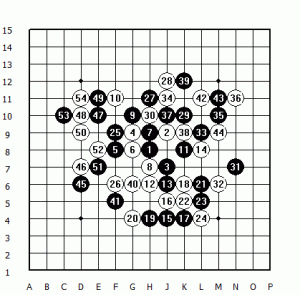
Round 13. Rizvanov E. – Karasyov M., = 54
The fourteenth round brings no breaking news. Kostya puts D13 to Denis Kachaev, expecting transtition into the common variant with i1, Denis acts as expected, Nikonov carefully performs the variant having White. Black quickly runs in the edge of the board, leaving White with a promising flank, where the win is forged on the forties. Filinov sharpens the struggle for the last place, overplaying Balabhai in D4, having beautifully dodged the foul. Egor successfully defends a draw against Pasha Salnikov, who did not find a VCT solution on 15th move. Makarov, who has not yet lost the chance of a bronze, plays an old 5th move in i8/i12 with Maxim Karasev, but he does not succeed in finding an antidote against the modern 10th move, reinforced by Maxim’s skill. So Maxim is victorious. Oleg Fedorkin for the third time plays the canonical development of D9 with a shift because he receives it from i4, this time against Rizvanov. Two times before he played the non-canonical 12th which becomes possible due to a shift, each time receiving difficult positions with White and gaining only 0.5 points from two games. Now he decides to return to the classics. The position allows any kind of mocking, so Edward plays some sweeping gomoku-style moves like 13th, 15th, 17th. They provide Edward with an attack, and Oleg’s mistake with the 30th move allows Rizvanov to win. In a duel for the medals, borshch takes place between me and Vanya. He opens with D3, I reply with the expected transfer to i5 with five alternatives. Until move 10, everything goes according to Danilin’s plan; after 11th, Vanya thinks for almost an hour and makes the 12th move which is losing easily. After 14th, without waiting for me to make a move, he stops the clock.
Before the last round, an intrigue remains for all places. Filinov, Morozov, Katsev, Balabhai are wishing to bounce from the last place. Even Kachaev has a theoretical possibility to be the last despite he is 12th by the beginning of the round. There are three contenders for two vacant places in the top-6: Makarov, Rizvanov (8.5 each) and Fedorkin (8). Danilin, Karasyov, Makarov and Rizvanov are aiming to the bronze medal, but Maxim and Vanya, of course, have better chances. Finally, me and Nikonov are going to decide who takes the gold and who is runner-up. The one of us who will score the most points in the last round will receive the trophy. Moreover, in the case of two victories, the result depends on several games of the round, primarily on the games of Danilin-Salnikov (the victory of Danilin is beneficial to me) and Rizvanov-Artemyev (the victory of Rizvanov is beneficial to Kostya).
I have an early train, so I suggest Mikhailov to start the game one hour earlier. He agrees. I put i10, offering to repeat the variant that we played a year ago. He thinks a bit and makes another 4th move, common with D7, with 7 alternatives. For me, this is a bit too much, so I take White. Some of Black’s moves, in my opinion, are a bit too passive, and by the 30th move White has an advantage. 31 looks like a mistake, but I’m very short in time, so I can’t find the exact win after 33. There is a simple foul idea on the top of the board, arising with a lift of some resources from the right side. Attempts to trick Alexey on the bottom flank do not bring success, Mikhaylov is accurate and sees everything. As a result, White meets the seventieth moves in defense. Meanwhile, Nikonov won, Karasyov lost, Danilin won (not only bringing me some Berger, but also achieving a bronze medal). Finally, in i5, Rizvanov defeats Artemyev, who made the not-so-good 9th move and subsequently played inaccurate. So it turns out that nothing depends on my game: Nikonov gets gold. Realizing this, I propose a draw. The game between Filinov and Lavrik-Karmazin ended in a draw. As a result, Filinov caught Yegor, who lost to Denis Kachaev, on points, but according to Berger, the last is Filinov.
Results.
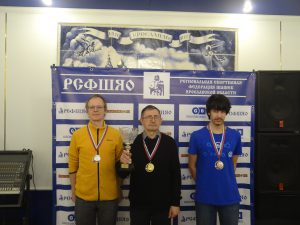
1. Nikonov K.
2. Epifanov D.
3. Danilin I.
4-6. Rizvanov E., Fedorkin O., Karasyov M.
7-10. Makarov P., Salnikov P., Lavrik-Karmazin M., Mikhaylov Alexey
11-16. Balabhai V., Kachaev D., Artemyev S., Katsev I., Morozov E., Filinov V.
Tournament table (sorted by places) is available here: http://renju.net/media/tourninfo.php?tournament_id=2211 Games are clickable.
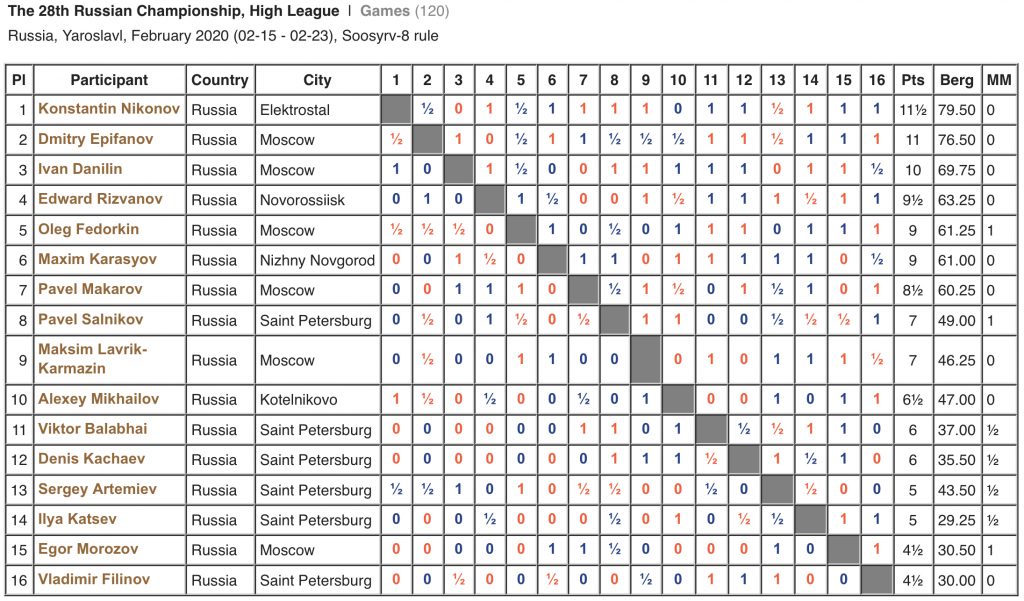
The tournament was very tight and intense, not a single obvious outsider, the youth began to show an excellent playing level, many thanks to everyone, it was exciting!
Photos in this post were made by Alexei Skuridin, diagrams made by RenjuBase.


